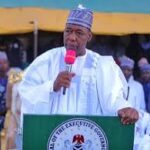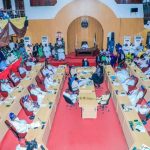The World Bank is reportedly set to approve loans totalling $1.75bn before the end of the year to the Federal Government for key development projects in Nigeria.
This was coming despite an earlier claim by President Bola Tinubu on Tuesday in Abuja that Nigeria had met its revenue target for 2025 ahead of schedule and would no longer rely on borrowing to fund its budget.
According to official data obtained from the World Bank’s official website, the loans will finance several key initiatives, including projects in agriculture, health, and digital infrastructure.
The Punch reported that one of the major projects set to benefit from this financial backing is the Nigeria Sustainable Agricultural Value-Chains for Growth project, which will receive $500m. This initiative is aimed at improving agricultural productivity and integrating value chains to support rural development and economic diversification.
The project is currently in the Concept Review phase, with approval expected on December 11, 2025.
Another project, the Building Resilient Digital Infrastructure for Growth, which has a commitment of $500m, aims to enhance Nigeria’s digital infrastructure and foster economic growth, particularly in the technology sector. The project is currently in the Begin Negotiation phase, with approval scheduled for October 31, 2025.
Similarly, the Health Security Programme in Western and Central Africa, Nigeria – Phase II, will receive $250m to strengthen Nigeria’s health systems and improve the country’s preparedness for health emergencies. This project is also in the Begin Negotiation phase, with approval expected by September 30, 2025.
Lastly, the Fostering Inclusive Finance for MSMEs in Nigeria project, which aims to improve access to finance for small and medium-sized enterprises, will be allocated $500m. This project is in the Concept Review phase, with approval set for December 18, 2025.
Collectively, these projects comprise the $1.75bn in loans expected to be approved by the World Bank before the end of the year.
The World Bank had approved a total of $8.40bn in fresh loans to Nigeria over the past two years, according to data obtained from the bank’s official website.
The approvals, covering the period from June 2023 to August 2025, spanned 15 projects in the energy, education, healthcare, rural infrastructure, and governance sectors. The amount comprises $1.95bn from the International Bank for Reconstruction and Development and $6.50bn from the International Development Association.
Reacting to the rising World Bank commitments to Nigeria,
Lagos-based economist, Adewale Abimbola, said loans from multilateral institutions such as the World Bank are largely concessionary, with interest rates typically below market levels and longer repayment tenors.
He noted that the critical question is not whether Nigeria should be borrowing, but whether the loans are structured and deployed effectively.
“If it’s concessionary and tied to viable projects with medium-term revenue prospects, I don’t think it’s a bad idea,” Abimbola explained. “Borrowing isn’t bad; what matters is utilisation.”
He stressed that the economic impact of such loans depends on how well they are channelled into projects that can generate sustainable growth, strengthen revenue, and improve public services over time.
However, Development economist and CEO of CSA Advisory, Dr Aliyu Ilias, expressed strong reservations over Nigeria’s rising debt profile in light of fresh World Bank commitments.
He recalled that when former President Muhammadu Buhari left office for President Bola Tinubu, the nation’s debt stock stood at about N87tn, but has since risen to around N149tn, with fears it could approach N180tn.
While acknowledging that borrowing is not inherently bad for an economy, he questioned the rationale for taking on more debt at a time when the government claims to have higher revenues.
Ilias pointed out that following the removal of fuel subsidy, Tinubu had announced increased revenue inflows. He added that both the Federal Inland Revenue Service and the Nigeria Customs Service had declared revenue surpluses, further suggesting the government should be able to fund projects without resorting to heavy borrowing.
According to him, the impact of the current borrowing spree is being felt in reduced public service delivery, particularly in capital expenditure, as debt servicing now consumes a significant portion of available revenue. He warned that this crowding-out effect limits job creation, fuels inflation, and worsens Nigeria’s foreign exchange imbalance, with the naira trading at historically weak levels.
He argued that given the claimed revenue surpluses, the Tinubu administration should not have needed to borrow within its first two years in office, let alone at the scale currently being witnessed.








